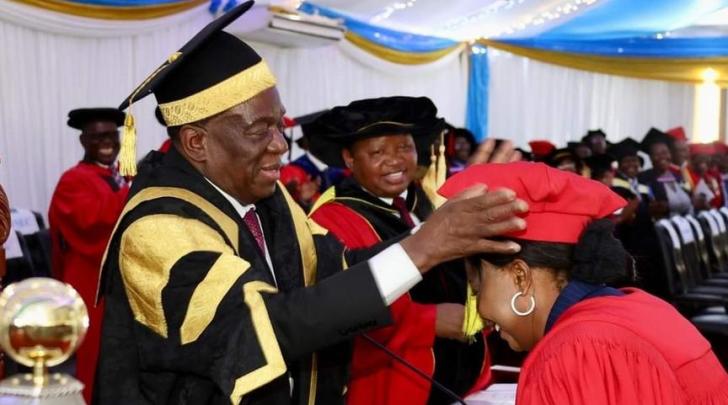Opinion / Columnist
Debate on Zimbabwe's 'PhD fever'
14 Dec 2024 at 15:22hrs |
0 Views

President Emmerson Mnangagwa is in Chiweshe, Mashonaland Central Province, celebrating his wife, First Lady Dr. Auxillia Mnangagwa, for attaining a Doctor of Philosophy (PhD) in Tourism and Hospitality Management from Midlands State University. The First Lady's achievement was marked by a high-profile graduation ceremony in Gweru, where President Mnangagwa personally capped her.
Dr. Auxillia's new academic milestone has drawn both praise and criticism, reigniting a broader conversation on the trend of Zimbabwean public officials pursuing doctoral degrees under contentious circumstances. This phenomenon has been likened to "academic credentialism," where advanced qualifications are sought not for genuine academic pursuit but for political, social, and career advantages.
Critics have pointed to the legacy of former First Lady Grace Mugabe, who in 2014 obtained a widely criticized PhD from the University of Zimbabwe. The degree's legitimacy was called into question due to alleged irregularities surrounding its awarding. Grace's academic controversies added to the public's discontent, eventually contributing to political tensions that culminated in the 2017 coup which ousted her husband, Robert Mugabe.
Vice President Constantino Chiwenga has also faced scrutiny over his own PhD from the University of KwaZulu-Natal, which has been a subject of public debate regarding the rigor and authenticity of his academic efforts.
This growing trend of high-ranking officials pursuing doctoral degrees has raised concerns about the misuse of academic achievements for personal aggrandizement and political expediency. Critics argue that many officials treat PhDs as a pathway to increased social status and political legitimacy rather than as a pursuit of genuine academic excellence or the acquisition of skills to benefit public service.
While higher education remains a noble and vital pursuit, observers emphasize that it should be motivated by a sincere commitment to learning and public betterment, rather than as a tool for consolidating power or enhancing prestige. This issue continues to provoke debate in Zimbabwe, particularly in light of the country's pressing socio-economic challenges.
As celebrations for Dr. Auxillia Mnangagwa's achievement continue in Chiweshe, the discourse around academic credibility and the role of education in leadership remains as pertinent as ever in Zimbabwe's political landscape.
Dr. Auxillia's new academic milestone has drawn both praise and criticism, reigniting a broader conversation on the trend of Zimbabwean public officials pursuing doctoral degrees under contentious circumstances. This phenomenon has been likened to "academic credentialism," where advanced qualifications are sought not for genuine academic pursuit but for political, social, and career advantages.
Critics have pointed to the legacy of former First Lady Grace Mugabe, who in 2014 obtained a widely criticized PhD from the University of Zimbabwe. The degree's legitimacy was called into question due to alleged irregularities surrounding its awarding. Grace's academic controversies added to the public's discontent, eventually contributing to political tensions that culminated in the 2017 coup which ousted her husband, Robert Mugabe.
This growing trend of high-ranking officials pursuing doctoral degrees has raised concerns about the misuse of academic achievements for personal aggrandizement and political expediency. Critics argue that many officials treat PhDs as a pathway to increased social status and political legitimacy rather than as a pursuit of genuine academic excellence or the acquisition of skills to benefit public service.
While higher education remains a noble and vital pursuit, observers emphasize that it should be motivated by a sincere commitment to learning and public betterment, rather than as a tool for consolidating power or enhancing prestige. This issue continues to provoke debate in Zimbabwe, particularly in light of the country's pressing socio-economic challenges.
As celebrations for Dr. Auxillia Mnangagwa's achievement continue in Chiweshe, the discourse around academic credibility and the role of education in leadership remains as pertinent as ever in Zimbabwe's political landscape.
Source - onine
All articles and letters published on Bulawayo24 have been independently written by members of Bulawayo24's community. The views of users published on Bulawayo24 are therefore their own and do not necessarily represent the views of Bulawayo24. Bulawayo24 editors also reserve the right to edit or delete any and all comments received.
Join the discussion
Loading comments…































